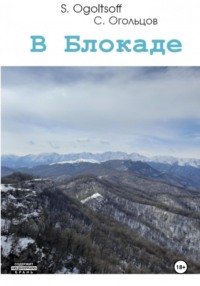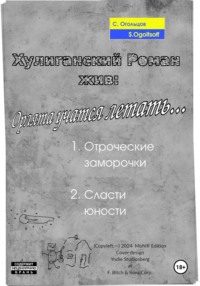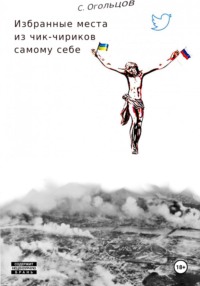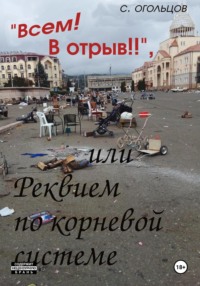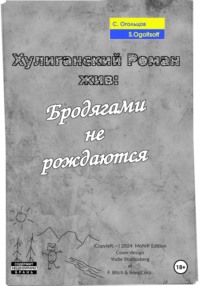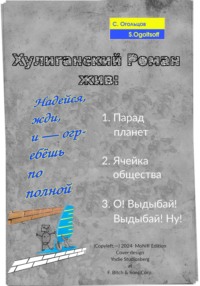
Полная версия
The Rascally Romance (in a single helluva-long letter about a flicking-short life)
Then all of a sudden, there came a strange feeling that I was not alone, that someone else was watching me from behind the backs of the mighty Firs. At first, it was scary but giving heed to the benevolent silence of the trees around, I realized that it was him, the forest, friendly spying on me because we were one—me and the forest… The twilight deepened and I remembered that Block was more than two kilometers away.
(…of course, I got home in the dark and bore the brunt of Mom’s displeasure, yet until now when recollecting that winter purplish twilight and the good-willed quietude of the forest, I know that I lived not just so…
The same feel of dissolving and turning into a part of everything else around when you cannot say where your “I” ends and turns this or that “not-me”, I've lived thru once again and much later, in Karabakh already. Only that time it was I who watched, and it happened in summer instead of winter.
Even though telling this story disrupts the linear flow of narrative, in full violation of the classical time-place-action-unity canon yet, after all, it is my letter and it’s my life, and why not to take turns to my liking?
So…)
~ ~ ~
In Stepanakert, I am not to be seen a day or two before my birthday and about as long after it because for that period I enjoy the freedom of hiking.
(…dig it? Summertime is the most advantageous season to be born into not only because fish are jumping and your daddy is rich…)
My local relatives have already given up to be surprised or get angry. They concluded that it’s an old, odd but firmly established, Ukrainian tradition—to go away for your birthday and just walk following a random look of your eyes. And so it was in August (I don’t remember the exact year) end nineties’. Yes, no later, because of this here tent was bought in the last year of the last millennium.
That August I went north thru the woods over toombs where there were no villages but the views of enthralling beauty. Exactly as in the age-old warning by Mom, “You’ll be there alone.”
After a day-long climbing up to ascend a toomb-ridge where the woods got replaced by the alpine meadows, I came across some soot-black pieces of slate and a bunch of charred poles. Apparently, before the war shepherds were coming there with their flocks, and they brought the construction materials to build a hovel. And who burned it? Well, you never know… why always to find fault with humans? could be a random lightning after all… Anyway, nothing of my business.
So, I passed and went on, higher, and in a saddle bridging two toombs I discovered an ancient toomb. How did I guess at its antiquity? An easy question… It was excavated, unearthed by scavengers greedy for a buried treasure who left a hole in the ground and 4 to 5 roughly-hewn stone slabs, half-ton each. People weren’t buried that way under socialism, nor in the capitalist epoch. The nearby ridges were not rocky so the slabs had to be transported from afar. But what for?
Well, one look around would remove the question— What a sweep of incredible beauty! The sky without any limit, the placid wavy chines of toomb-chains all around, the distant ones covered with dark woods, and those nearby with Alpine meadows… Now, bringing the slabs from as far as I could not suppose where would call for a plum sum of money, or real power, or both. Which made more than enough of clues for the unbeatable guess: it was one of the Karabakh melique-princes who one day rode out hunting, reached that place and fell in love with it, and didn’t want to get parted from it even after his demise. The only nagging flaw in his calculations— the greed of ashes desecraters was not taken into account.
See? No historical enigma can escape its ultimate solution when we apply to it our tall tales in the absence of any opponent…
I passed over to the next toomb and, on its summit, got under the rain. Not a big deal though, because for such occasions, I’ve got a thoroughly worked-out and pretty practical technique.
So, as usual, I took off all of my clothes, packed them into a cellophane bag and started dancing in the altogether under the downpour. Those dances, actually, were never meant as some pagan ritual, they're intended to keep me warm, in the mountains up there without the sun and under the rain it’s really chilly, let me assure you. But still some tinge of witching paganism is also there or else where those primeval yells come from to accompany the free nude dances? Anyway, solitude does have certain advantages— you’re not likely to be arrested for violation of public order and morals.
And, after the rain is over, I simply rub-dry myself with the sweater and put on the dry clothes from the bag, ain’t I a smart guy?
But that time after one rain there came another, and my second dancing was not as enthusiastic as the previous. The additional rain also let up after all, and I prepared to stay overnight in a shallow hollow to hide from the cold night wind.
About midnight the drops of one more rain tap-tapped on my sleeping bag and made me realize that I was kaput. A raging stream of rainwater ran down the hollow, I struggled out of the sleeping bag put it on my back and stood with my legs wide apart giving way to the running spate. That’s when I guessed that my sleepover spot was just a gulch, but I could not leave it either because of the squally wind joining the fun. There was nothing to do but wait for the dawn in the posture of the letter Z, clutching my knees with my hands, under the sleeping bag on my back, drenched thru and thru, and the rivulet running between my feet. The uncontrollable inside shudder mingled with the lashing by outside chilly rains, which that night I lost count of…
The morning started thru a thick mist, yet with no rain, except for random drizzling, and the wind also began to abate… Jerking like an epileptic, I squeezed the water out of my clothes and the sleeping bag, as much as my cold-stiffened hands could manage to. I had not the slightest desire to go any farther, hearth and home were all I craved for. So, I went back, yet even walking did not warm me up, I was too busy being trembling all the time.
Normally, going downhill is easier than going uphill, but for me that difference was somehow gone and at times I was sort of floating, while to the hearths of civilization there still remained at least a day of normal walking. That’s when I remembered the slate— it was much closer if only I could find it. It’s somewhere along the edge of the wood. For which reason, down that toomb, I was descending in zigzags so as not miss the slate pieces in the tall grass.
And I did find the place.
Seized by the sticky shivering tremor on one hand and overwhelming stiffness on the other, I started to restore the shed and the work warmed me better than walking… The thing I accomplished looked like a crude tent of fire-smeared slate pieces. Inside, it was tall enough for sitting on the ground and more than enough to stretch for the whole body length.
Then I built a fire at the entrance with the wreckage of poles and deadwood which I dragged from the nearby coppice. I warmed my sides by the fire and began to dry up the sleeping bag. When the color of its fabric turned lighter and stopped issuing any steam, I believed in the probable survival.
All next day the sun was glaring blindingly, but I had a slanted roof of slates over my head supported by the charred poles—used as the promenade by the soundless lizards as lazy as I was, because in all that day I went out just once— to collect an armful of grass and spread it under the sleeping bag on the ground…
And so it went on, day after day, without any changes, if not for the growing company—cautious dormice joined me and the lizards. They did not dare step over the fire ashes, so I left a piece of baked potato outside, but the rest, together with bread and cheese, hung in the haversack up the rafter poles under the slate.
At nights, the full moon rose to fill the world with clear-cut shadows. On one of those well-illuminated nights, I went out to take a leak, and on the way thru the tall grass, from under my feet there burst a brood of quail with the loud flutter of wings and shrill outcry, “Damn sleepwalker! Watch your step! We’re sleeping here!” As if I was not scared stiff by them!
In the light of day, over the wide expanse of the valleys, the vultures glided without ever moving their wings. Watching them from the depths of valleys you turn your face up to see their circling so high above, but now, lying on my sleeping bag, I didn’t even have to stick my head out of the slate tent.
When one of them trespassed the invisible borderline between their hunting grounds, the skylord soared higher and, folding his wings, fell down upon the brazen prowler like a stone. I heard the wheezing sound of the air cut by his dive next to the slate tent entrance. He missed, however, or maybe was not keen on hitting but only wanted to warn and shoo off the sneaking bastard. All of us are blood kin, after all.
And so it went on…
All my business was to roll over from one side to the other, from the belly to the back, having no desires, neither ambitions nor plans. Sometimes, I was falling asleep with no regard to the time of day because it made no difference…
Well, and I also watched, of course. I watched how beautiful and perfect the world is…
Sometimes I think, maybe the purpose of man’s existence is just seeing this beauty and perfection. Man is merely a mirror for the world to look into, otherwise, it would not know its own beauty…
Six days later, I returned to civilization, just for the sake of righteousness.
On coming back, to all the questions I responded in quite a laconic way because my vocal cords, after being idle for so long, became too lazy and I could only speak in a hoarse whisper.
(…all I want to say is that both times—in that winter forest, and among the summer toombs—I had the same feeling that I was not alone and someone else was watching that ski-riding kid and the supine lazybones in the shade of burned slate pieces and, more strangely, I was a part of that someone and watched myself from the twilight of the winter forest and from the tall grass on the toomb slope because we all are involved…
Well, on the whole, some weird stuff, a folly accomplished…)
~ ~ ~
With the spring at hand, we, the fourth-graders, started active preparation for getting enrolled to the ranks of young pioneers to reach which goal we copied and memorized the Solemn Oath of Young Leninists. Then one day after the break, Seraphima Sergeevna entered the classroom with an unknown woman. She introduced her as the new School Pioneer Leader and said that we were going to have a Leninist Lesson and for that purpose we had to go out into the corridor now and keep very quiet there because the other classes were at their regular lessons.
We went out into the long corridor on the second floor, where along its walls with the windows on the left and the rare doors to the classrooms on the right, there hung different pictures with differently-aged Lenin in all of them… The new School Pioneer Leader commenced from the very beginning. Here, he’s quite a young man, a youth, actually, after getting the news about the execution of his elder brother Alexander by the Czarist regime, he consoles his mother with the words “We’ll go another way”, which is the name of this famous picture, by the way.
And our class followed her quietly to the next poster with his photograph in the group of comrades from the underground committee… The working silence reigned in school, we passed by the closed doors of the classrooms with the school children sitting behind them and only we, like secret conspirators, veered from the usual course of the school regime and seemed to have joined the life of underground, following the quiet voice directing us from a picture to a picture…
Then the spring came, and again the thawed patches appeared on the slope between Block and the Recruit Depot Barracks but I wasn’t checking them anymore… One sunny day coming home from school, I took over an unfamiliar girl of my age. Maybe, from the parallel fourth grade. I get ahead of her and looked back at the face full of absolute lack of care about my walking along.
The brag just asked for a small demonstration that I was a boy of consequence in the surrounding whereabouts. And besides, I had a gang of my own, like Robin Hood, the noble robber. Still walking on, I half-turned to the left and told with eloquent gestures to the Bugorok-Knoll beyond the decaying skating rink, “Hey! Don’t be so careless! Duck!! Don’t let them spot you!” So, if the snooty girl looked that way, no one would be seen there…
Another time, with the snow, completely gone, I was going the same route and squinting because if you squint without closing your eyes completely, but only to the point when the eyelashes from your upper and lower eyelids meet and touch each other, you’d see the world as if thru the transparent wings of a dragonfly. That way I was not, actually, walking but flying in a tiny dragonfly-like helicopter and watching thru its Plexiglas roof which I saw in The Funny Pictures because even though I was past the preschool age I still turned pages of that magazine for small kids whenever it came my way.
And then I remembered how rebellious Kotovsky, in the movie “Kotovsky” at the Regiment Club, answered the arrogant landlord, “I am Kotovsky!” After which he grabbed him and threw thru the window panes of the landlord’s house.
So I also grabbed the rich scoundrel by the breast of his jacket and threw him into the roadside ditch. And I proudly called myself with the glorious name, “I am Kotovsky!” Yay! And it was so good to feel myself so strong. That’s why I replayed the episode several times walking uphill to Block. And why not? Who was to see me along the empty road?
At home, Mom told how she and Paulyna Zimin had a hearty laugh watching thru the neighbor’s window my grabs and throws of nobody knew who. But I never confessed that I was Kotovsky at the moment….
End April, we became young pioneers. The ceremony took place not at school but in front of the House of Officers because there stood the big gypsum head of Lenin upon the tall pedestal.
The night before, Mom ironed my trousers thru gauze and also the white parade-shirt and the scarlet silk triangle of pioneer tie. All those things she hung over the back of a chair so that in the morning everything would be ready. When there was no one in the room, I touched the soft caressing fabric of the pioneer tie. Mom said she had bought it from the store, but it’s impossible for such things to be for sale.
The bright morning sun was shining. We, the fourth-graders, stood facing the lined-up ranks of the school children. Our scarlet ties hung on our right arms bent at the elbow, the collars of our shirts were turned up for the senior graders to easily tie our ties around.
Yet before that moment, we chanted the memorized Solemn Oath in front of our comrades to love our Homeland hotly, to live and learn and struggle as admonished by great Lenin, as we were always being taught by the Communist Party….
One week before the end of the academic year I fell ill. Mom thought it was a cold and told me to stay in bed but could not bring the temperature down, and when it rose up to forty she called an ambulance from the Detachment’s Hospital because with two more degrees the temperature would become lethal.
I was too lightheaded to be proud or frightened that a whole vehicle came after just me alone. At the hospital, they at once diagnosed pneumonia and began to knock the temperature down with penicillin injections every half-hour. I did not care. A day later the injection frequency was reduced to one per hour, the following day – one in two hours…
The patients in the ward were all adults, soldiers from the Regiment. In four days, I was quite okay and walking in the garden around the Hospital, when our class together with the teacher came to visit me and hand over the report card with my grades.
I felt uncomfortable and, for some reason, ashamed, so I ran away around the corner followed by the boys of our class. But then we returned, and the girls together with the teacher handed me my award for successful studies and exemplary behavior. It was the book of The Russian Epic Tales which Grandma Martha read to me, and my sister-'n'-brother, but only quite a new one… That way, little by little, things began somehow repeat themselves in my life…
In summer we were again taken to the pioneer camp to the same canteen, lining-ups, bedroom ward, “stiff hours”, and Parental Days. Though certain things had notably changed because as a full-fledged pioneer, I already belonged to the Third Platoon which, together with the First and Second ones, was eligible for swimming in the lake. But first, we had to wait a week in anxious hope that it shouldn’t rain on the appointed day.
We waited eagerly, and on the swimming day the weather was not rainy, so two trucks with canvas tops took us to the Sominsky lake. The road went thru the forest, along some narrow endless clearing. And the ride was also very long because we had sung all the pioneer songs, both my favorite “ah, potato’s so tasty-tasty-tasty-tasty…”, and the one I liked less, but still for pioneers – “we marched to the ding of the cannonade…”, and, well, all that we knew, anyway, but the road did not end and I felt sick with all those jolts on the bumps in the road. Then those, who sat at the square window cut in the front canvas wall, shouted that something was seen ahead and the truck pulled up on a grassy shore of a big lake amid the forest.
They allowed us to enter the water not all at once but in turn, one platoon after another. The water was very dark, and the bottom felt unpleasantly quaggy, and they too soon yelled from the shore, “Third platoon – out!”
At first, I only stood up to the chest in the water doing shallow hops. But then they gave me an air-filled life ring of rubber and showed how to row with my hands and kick my legs for swimming. Soon both the caretakers and the pioneer leaders grew bored to command the platoons in and out of the water, so everybody stayed there as long as they wanted. I let the air out of the life ring and made sure that I could still swim for a couple of meters.
At the end of the day, when they yelled everyone to get ashore because we were leaving, I tarried a bit for the final check that the skill remained by me and gratefully uttered in my mind, “Thank you, the Sominsky lake!”
The next time, they took us to the Lake of Glubotskoye. The elder platoons said it was even better because the lake had a beach and sandy bottom. The way over there was much longer but asphalted, and we were going by bus so I was not sick at all.
Yay! What a huge lake it was! They said channels were connecting it to other lakes visited by passenger boats with excursions to the Ant Island. The island was so big that long ago there was a monastery surrounded with the forest full of giant ant-heaps. Whenever any of the monks was not behaving, they tied him up and dropped onto an ant-heap. The ants thought they got under attack and hurried out to defend their city, so in just one day they gnawed the punished away, leaving only his polished skeleton.
But from the bathing place neither boats nor islands were seen, only the very distant opposite shore. Yet, the bottom turned out sandy indeed, firm and pleasant to step along, only you had to wade and wade on before you reached a place deep enough for swimming.
When wading back, I deeply cut my feet near the big toe. The cut was bleeding profusely and, on the shore, they bandaged it at once. A dark spot showed thru the bandage, but the blood stopped spewing.
They yelled to everyone about the beach to be cautious, and then one of the adults found a broken bottle in the sandy bottom and threw it farther away in the direction of the opposite shore, but it did not console me. On our way back, I even began to whimper because it felt so hurting and unfair that in the whole bus only just one foot got cut and it was mine.
One of the caretakers told me, “What a shame! Are you a guy or a dishrag?”
The question stopped my sniveling, and in my subsequent life, whenever traumatized, I mulishly pretended not to feel pain and acted a manly man.…
Twice per shift, we were taken to the bath-house in the nearby village of Pistovo. The first time I missed because I went back to the platoon ward to pick the forgotten bar of soap, and when I came running back, the buses had already left.
The camp became quiet and empty, there remained only the cooks at the canteen and me. You could do whatever you wanted and go wherever you wished, even to the tents of First Platoon with iron beds on the rough floor-boards, where the finely carved shadows of the nearby tree foliage danced upon the sun-warmed canvas walls. But I, for some reason, climbed upon the narrow booth of deals with an iron barrel on its top.
It was the shower for the caretakers and pioneer leaders, who filled half the barrel with pails of water for the sun to heat it. The whole two-hour solitude I spent atop that booth, wandering along the narrow beams supporting the barrel, until the camp returned from Pistovo…
And I did not miss the second visit to the bath-house, but it disappointed me—the huge unbearably noisy room had no bath-tubs at all! You had to wash yourself throwing water up at you from a tin basin with tin ears for grabbing when carried. On the wall, there were two taps, side by side, one for boiling hot water, and the other for cold. You put your basin on a low table beneath the taps but it was hard to mix their waters to your liking because the line of boys with their empty basins yelled from behind your back to be quick…
The shift at the camp traditionally ended with the Farewell Bonfire which was built in the far end of the field with the rusty mast of the never-used attraction nearby the edge of the forest behind the barbed wire.
After the breakfast in the morning, the senior platoons marched to that forest thru a temporary passage in the 2-barbed-wire fence opened by a couple of 2-meter-tall spanner-boughs and harvested dry firewood for the Farewell Bonfire. The harvesting went on after the "stiff hour" too and by the evening on the field edge accumulated a heap of dry branches taller than a grown-up man. In the dusk of the nearing summer night, that heap was set on fire from all sides and burnt with high flames under our choral songs, and the marches from the accordionist.
Then Camp Director and the caretakers began to argue in agitated voices. Finally, Camp Director agreed and gave the orders to his chauffeur. The man shrugged and answered: “If you wish so,” walked to the camp buildings, and drove back in the Camp Director’s car. From the trunk, the chauffeur grabbed a metal canister while the pioneers were ordered to step back from the fire. He splashed onto it from the canister in his hands, and a huge ball of red-and-black flame buzzed and swirled up in the night, for at least three meters high, and then fell back again until the next splash.
In the morning, the buses were taking us home….
~ ~ ~
However, the end of the camp shift did not mean the end of summer. And again there was the Rechka river and playing War-Mommy, Cossacks-and-Robbers, American Ball, and Twelve Chips, as well as the new adventures, borrowed from the Detachment’s Library. However, besides the travels to distant planets and mysterious islands started from the opposite armrests of the big sofa, I also wandered in the forest for quite a few different reasons.
For instance, our neighbor Yura Zimin suggested going there to harvest the Hare Cabbage, and I grew curious about the unheard-of vegetable. Well, though sour, it still was tasty but picking it turned a literal toil because its leaves were so too tiny.
Or else, my sister Natasha would bring the news that in the swamp behind the next block, there were myriads of blueberries, and one boy from the other block brought home a whole milk-can of them! Now, the spirit of competition drove me to the same swamp, I had to collect more blueberries than any “one boy”! Good news the Lowlanders hadn’t come to pillage harvest from a swamp upon the Gorka…


